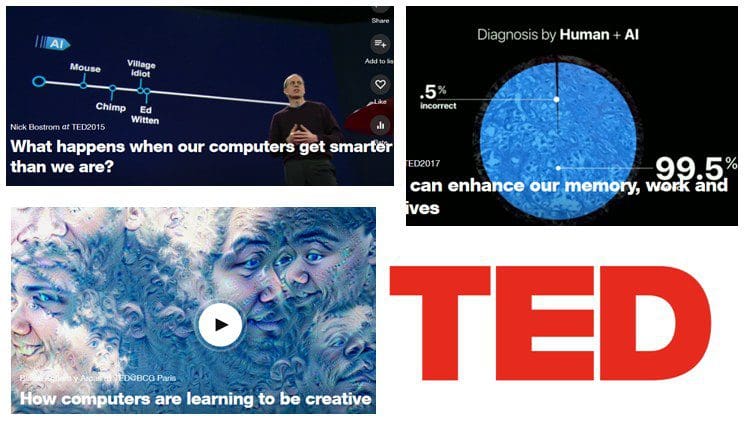 Top 10 TED Talks for Data Scientists and Machine Learning Engineers
Top 10 TED Talks for Data Scientists and Machine Learning Engineers
A comprehensive and diverse compilation of TED talks to understand the big picture of AI and Machine Learning.
Sometimes, when we are too focused on learning about the technical implementations of Machine Learning we tend to ignore important issues of this technology like its future applications and political consequences. In this post, instead of discussing what language to use or what algorithm works best for a problem, we have gathered a set of videos from the highly popular nonprofit organization, TED.
In this series of videos, you will find interesting discussions and conferences about AI and Machine Learning from a "big picture" perspective. You will hear about the different positions regarding the upcoming developments in the field, its implications, advantages, and consequences on a world-wide scale. Topics range from the politics and technological responsibilities of AI; its impact on the future job market, and even about the its role in art.
I hope you enjoy watching these talks as much as I did
- What happens when our computers get smarter than we are?, Nick Bostrom, 3.1M views. @FHIOxford.
Artificial intelligence is getting smarter by leaps and bounds -- within this century, research suggests, a computer AI could be as "smart" as a human being. A philosopher and technologist, Bostrom asks us to think hard about the world we're building right now, driven by thinking machines. Will our smart machines help to preserve humanity and our values -- or will they have values of their own? - Can we build AI without losing control over it?, Sam Harris, 3.0M views, @SamHarrisOrg.
Scared of super intelligent AI? You should be, says neuroscientist and philosopher Sam Harris -- and not just in some theoretical way. We're going to build superhuman machines, says Harris, but we haven't yet grappled with the problems associated with creating something that may treat us the way we treat ants. - The jobs we'll lose to machines - and the ones we won't, Anthony Goldbloom, 2.1M views, @antgoldbloom.
Machine learning isn't just for simple tasks like assessing credit risk and sorting mail anymore -- today, it's capable of far more complex applications, like grading essays and diagnosing diseases. With these advances comes an uneasy question: Will a robot do your job in the future. - We're Building a Dystopia Just to Make People Click on Ads, Zeynep Tufekci, 1.7M views, @zeynep.
In an eye-opening talk, she details how the same algorithms companies like Facebook, Google and Amazon use to get you to click on ads are also used to organize your access to political and social information. And the machines aren't even the real threat. What we need to understand is how the powerful might use AI to control us -- and what we can do in response. - How we'll earn money in a future without jobs, Martin Ford, 1.5M views, @MFordFuture.
Machines that can think, learn and adapt are coming -- and that could mean that we humans will end up with significant unemployment. What should we do about it? In a straightforward talk about a controversial idea, futurist Martin Ford makes the case for separating income from traditional work and instituting a universal basic income. - How computers are learning to be creative, Blaise Agüera y Arcas, 1.49M views, @blaiseaguera.
Blaise, principal scientist at Google, works with deep neural networks for machine perception and distributed learning. In this captivating demo, he shows how neural nets trained to recognize images can be run in reverse, to generate them. The results: spectacular, hallucinatory collages (and poems!) that defy categorization. - How AI can enhance our memory, work and social lives, Tom Gruber, 1.47M views. He shares his vision for a future where AI helps us achieve superhuman performance in perception, creativity and cognitive function -- from turbocharging our design skills to helping us remember everything we've ever read and the name of everyone we've ever met.
- How AI can bring a second Industrial Revolution, Kevin Kelly, 1.46M views, @kevin2kelly.
Over the next 20 years, he says, our penchant for making things smarter and smarter will have a profound impact on nearly everything we do. Kelly explores three trends in AI we need to understand in order to embrace it and steer its development. - Don't Fear Super Intelligent AI, Grady Booch, 1.44M views, @Grady_Booch.
New tech spawns new anxieties, says scientist and philosopher Grady Booch, but we don't need to be afraid an all-powerful, unfeeling AI. Booch allays our worst (sci-fi induced) fears about super intelligent computers by explaining how we'll teach, not program, them to share our human values. Rather than worry about an unlikely existential threat, he urges us to consider how artificial intelligence will enhance human life. - 3 Principles for Creating a Safer AI, Stuart Russell, 1.23M views. How can we harness the power of superintelligent AI while also preventing the catastrophe of robotic takeover? As we move closer toward creating all-knowing machines, AI pioneer Stuart Russell is working on something a bit different: robots with uncertainty. Hear his vision for human-compatible AI that can solve problems using common sense, altruism and other human values.
Related

 Top 10 TED Talks for Data Scientists and Machine Learning Engineers
Top 10 TED Talks for Data Scientists and Machine Learning Engineers